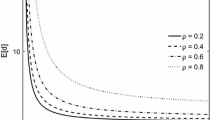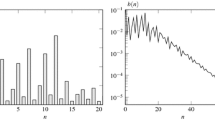Abstract
This paper studies a single removable server in a G/M/1 queueing system with finite capacity where the server applies an N policy and takes multiple vacations when the system is empty. We provide a recursive method, using the supplementary variable technique and treating the supplementary variable as the remaining interarrival time, to develop the steady-state probability distributions of the number of customers in the system. The method is illustrated analytically for exponential and deterministic interarrival time distributions. We establish the distributions of the number of customers in the queue at pre-arrival epochs and at arbitrary epochs, as well as the distributions of the waiting time and the busy period.
Similar content being viewed by others
References
C.E. Bell, Characterization and computation of optimal policies for operating an M/G/1 queueing system with removable server, Oper. Res. 19 (1971) 208–218.
C.E. Bell, Optimal operation of anM/G/1 priority queue with removable server, Oper. Res. 21 (1972) 1281–1289.
U. Chatterjee and S. Mukherjee, GI/M/1 queue with server vacation, J. Oper. Res. Soc. 41 (1990) 83–87.
B.T. Doshi, Queueing systems with vacations – a survey, Queueing Systems 1 (1986) 29–66.
S.W. Fuhrmann and R.B. Cooper,Stochastic decompositions in the M/G/1 queue with generalized vacations, Oper. Res. 33 (1985) 1117–1129.
K.G. Gakis, H.K. Rhee and B.D. Sivazlian, Distributions and first moments of the busy and idle periods in controllable M/G/1 queueing models with simple and dyadic policies, Stochastic Anal. Appl. 13 (1995) 47–81.
M. Hersh and I. Brosh, The optimal strategy structure of an intermittently operated service channel, European J. Oper. Res. 5 (1980) 133–141.
D.P. Heyman, Optimal operating policies forM/G/1 queueing system, Oper. Res. 16 (1968) 362–382.
F. Karaesmen and S.M. Gupta, The finite capacity GI/M/1 queue with server vacation, J. Oper. Res. Soc. 47 (1996) 817–828.
O. Kella, The threshold policy in the M/G/1 queue with server vacations, Naval. Res. Logist. 36 (1989) 111–123. 160 J.-C. KE
M. Kijima and N. Makimoto, A unified approach to GI/M(n)/1/K and M(n)/G/1/K queues via finite quasi-birth–death processes, Commun. Statist. Stochastic Models 8 (1992) 269–288.
T. Kimura, Optimal control of an M/G/1 queueing system with removable server via diffusion approximation, European J. Oper. Res. 8 (1981) 390–398.
G.V. Krishna Reddy, R. Nadarajan and R. Arumuganathan, Analysis of a bulk queue with N-policy multiple vacations and setup times, Comput. Oper. Res. 25 (1998) 957–967.
P.-V. Laxmi and U.C. Gupta, On the finite-buffer bulk-service queue with general independent arrivals: GI/M[x]/1/N, Oper. Res. Lett. 25 (1999) 241–245.
S.S. Lee, H.W. Lee and K.C. Chae, On a batch arrival queue with N policy and single vacation, Comput. Oper. Res. 22 (1995) 173–189.
H.W. Lee, S.S. Lee, J.O. Park and K.C. Chae, Analysis ofM[x]/G/1 queue with N policy and multiple vacations, J. Appl. Probab. 31 (1994) 467–496.
H.S. Lee and M.M. Srinivasan, Control policies for the M[x]/G/1 queueing system, Managm. Sci. 35 (1989) 708–721.
Y. Levy and U. Yechiali, Utilization of idle time in an M/G/1 queueing system, Managm. Sci. 22 (1975) 202–211.
H. Takagi, Queueing Analysis: A Foundation of Performance Evaluation, Vol. I, Vacation and Priority Systems, Part I (North-Holland, Amsterdam 1991).
J. Jr. Teghem, Optimal control of a removable server in an M/G/1 queue with finite capacity, European J. Oper. Res. 31 (1987) 358–367.
N. Tian, D. Zhang and C. Cao, The GI/M/1 queue with exponential vacations, Queueing Systems 5 (1989) 331–344.
H.C. Tijms, Stochastic Modelling and Analysis (Wiley, New York, 1986).
K.-H. Wang and H.-M. Huang, Optimal control of an M/Ek/1 queueing system with a removable service station, J. Oper. Res. Soc. 46 (1995) 1014–1022.
K.-H. Wang and H.-M. Huang, Optimal control of a removable server in an M/Ek/1 queueing system with finite capacity, Microelectronics Reliability 35 (1995) 1023–1030.
K.H. Wang and J.-C. Ke, A recursive method to the optimal control of an M/G/1 queueing system with finite capacity and infinite capacity, Appl. Math. Modelling 24 (2000) 899–914.
M. Yadin and P. Naor, Queueing systems with removable service station, Oper. Res. Quart. 14 (1963) 393–405.
Author information
Authors and Affiliations
Rights and permissions
About this article
Cite this article
Ke, JC. The Analysis of a General Input Queue with N Policy and Exponential Vacations. Queueing Systems 45, 135–160 (2003). https://doi.org/10.1023/A:1026045706255
Issue Date:
DOI: https://doi.org/10.1023/A:1026045706255




